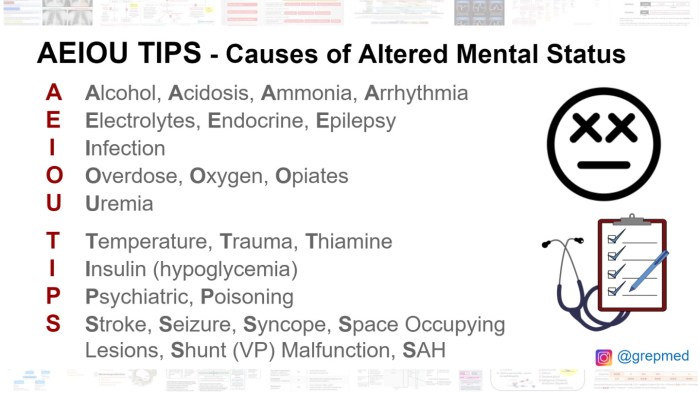Which statement is true about mental status changes? This question delves into the multifaceted nature of mental status, encompassing its definition, causes, assessment, treatment, and societal impact. Understanding mental status changes is crucial for both individuals and society, as they can significantly affect cognitive abilities, functional limitations, and social interactions.
Mental status changes refer to alterations in a person’s cognitive, emotional, or behavioral functioning. These changes can range from mild and transient to severe and persistent, and they can be caused by various factors, including medical conditions, medications, and psychological stressors.
Early detection and intervention are essential for managing mental status changes effectively, as they can help prevent long-term complications and improve overall outcomes.
1. Definition and Overview of Mental Status Changes

Mental status changes refer to alterations in an individual’s cognitive, emotional, and behavioral functioning. These changes can range from mild to severe and can be transient or persistent.
Mental status changes can manifest in various ways, including:
- Impaired attention and concentration
- Memory deficits
- Disorganized thinking and speech
- Mood disturbances
- Changes in behavior and social functioning
2. Causes and Risk Factors for Mental Status Changes

Medical Conditions
Mental status changes can be caused by various medical conditions, including:
- Brain injuries
- Neurological disorders (e.g., Alzheimer’s disease, Parkinson’s disease)
- Metabolic disturbances (e.g., hypoglycemia, hyperthyroidism)
- Infections (e.g., meningitis, encephalitis)
- Substance abuse
Medications
Certain medications, such as sedatives, antidepressants, and antipsychotics, can cause mental status changes as side effects.
Psychological Factors
Mental status changes can also be caused by psychological factors, such as:
- Stress
- Anxiety
- Depression
- Bipolar disorder
- Schizophrenia
3. Assessment and Evaluation of Mental Status Changes
Assessing and evaluating mental status changes involve a comprehensive approach that includes:
- Medical history and physical examination
- Mental status exam
- Neuropsychological testing
Early detection and intervention are crucial for managing mental status changes effectively.
4. Treatment and Management of Mental Status Changes: Which Statement Is True About Mental Status Changes

The treatment of mental status changes depends on the underlying cause and severity of the condition.
Medical Interventions
Medical interventions may include:
- Medications
- Electroconvulsive therapy (ECT)
- Brain stimulation therapies
Psychotherapeutic Interventions
Psychotherapeutic interventions may include:
- Cognitive behavioral therapy (CBT)
- Dialectical behavior therapy (DBT)
- Psychoeducation
Lifestyle Modifications
Lifestyle modifications may include:
- Regular exercise
- Healthy diet
- Adequate sleep
- Stress management techniques
5. Impact of Mental Status Changes on Individuals and Society

Impact on Individuals
Mental status changes can have a significant impact on individuals, including:
- Cognitive impairment
- Functional limitations
- Social isolation
- Reduced quality of life
Societal Implications, Which statement is true about mental status changes
Mental status changes also have societal implications, such as:
- Increased healthcare costs
- Caregiver burden
- Stigma and discrimination
Q&A
What are the common causes of mental status changes?
Mental status changes can be caused by a wide range of factors, including medical conditions (e.g., stroke, dementia, brain injury), medications (e.g., sedatives, antidepressants), and psychological stressors (e.g., trauma, grief, anxiety).
How are mental status changes assessed?
Mental status changes are typically assessed through a mental status examination, which involves observing and questioning the individual to evaluate their cognitive, emotional, and behavioral functioning. Neuropsychological testing may also be used to assess specific cognitive abilities.
What are the treatment options for mental status changes?
Treatment options for mental status changes vary depending on the underlying cause and severity of the symptoms. They may include medication, psychotherapy, lifestyle modifications, and support groups.